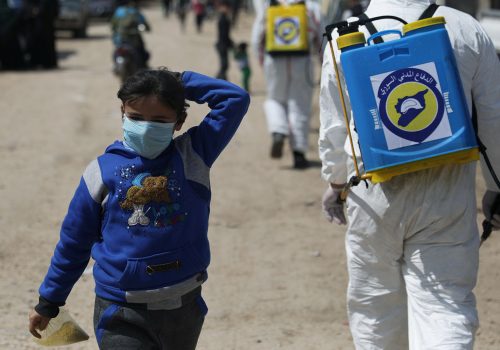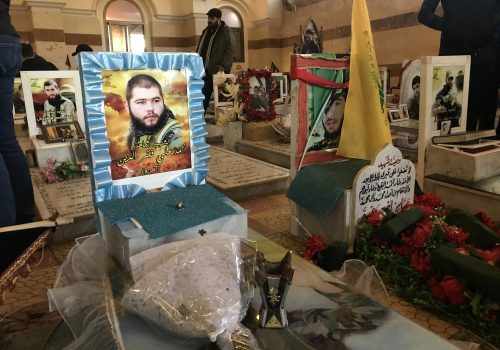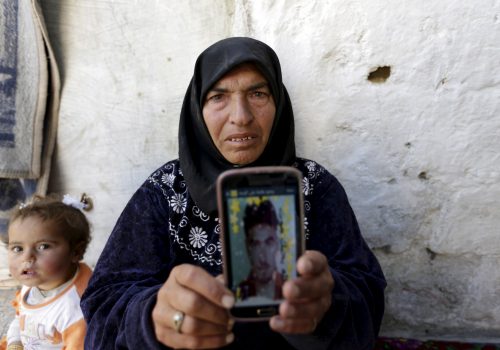ICMP report highlights need to launch missing persons process for Syria
The issue of missing and disappeared persons is complex everywhere, but especially in the Syrian context. An estimated 130,000 persons have gone missing in the present conflict, while the country already has a pre-war legacy of missing and disappeared persons cases—most notably from the 1982 Hama massacre. Syrians who have fled the fighting have gone missing along migratory routes and have been disappeared as a result of organized crime. At the same time, non-Syrians have gone missing in Syria, including journalists, Islamic State of Iraq and al-Sham (ISIS) fighters, and combatants from foreign armies.
According to United Nations estimates, hundreds of thousands of Syrians have been killed, more than 6.6 million have been displaced inside the country, and a further 5.6 million have fled Syria, seeking safety in Lebanon, Turkey, Jordan, Iraq, Europe, and farther afield. As a result, relatives of the missing have been scattered throughout the world, making the task of locating those who have disappeared all the more challenging.
In 2016, the International Commission on Missing Persons (ICMP) launched a Syria/MENA Program with the object of laying the foundations for an effective missing persons process. From May 2019 to May 2020, ICMP facilitated discussions under Chatham House rules with Syrian civil society organizations, family associations, and international partners. They attempted to develop a shared vision on concrete measures that can be jointly undertaken to establish an effective missing persons process. Key themes that emerged from these sessions held in The Hague, Istanbul, and—due to the pandemic—online, are summarized in the report: “Accounting for Missing Persons is an Investment in Peace: ICMP Syria Policy Process with Syrian Civil Society Organizations and Families of the Missing.”
While the present Syrian government is unlikely to cooperate, much can be done in the short and medium term to lay the groundwork for a sustainable and credible process. Finding more than 130,000 missing persons will require investigations across Syria and beyond. Thus, the most urgent task is to establish a central, impartial data repository on missing persons, which is absolutely indispensable if this is to work.
The process will also require the consistent use of scientific methods, including the collection of genetic samples for DNA-based identifications, while maintaining meticulous chain-of-custody protocols so that any gathered evidence can be used in court to prosecute perpetrators of disappearance.
Gathering the data to locate and identify the missing requires the cooperation of governments. Millions of Syrians live in countries neighboring Syria and many others are in Europe. By sharing information and granting access to refugee populations to collect data, including genetic reference samples, and by helping to fund the overall missing persons process, governments can ensure that their obligations under international law are fulfilled and the rights of families of the missing are upheld.
Post-war recovery will not be sustained unless state institutions that can investigate missing persons cases and address the legal demands of survivors are established in Syria. ICMP is working with other international organizations and with Syrian civil society to build a sustainable and coordinated process. As part of this effort, it has established a Policy Coordination Group comprising families of the missing, civil society organizations, and international actors. The Group will develop legislative and institutional frameworks that can help to secure the rights of families of the missing in a future Syria.
Syrian organizations have highlighted the importance of developing a charter of ethical principles to which different groups can subscribe—regardless of political affiliation—as a building block of effective cooperation. They have also identified a need for funding, so that Syrian organizations can advocate effectively on the issue of persons held in Syrian prisons and places of incommunicado detention.
It is imperative that the effort to account for Syria’s missing is undertaken and sustained within a clear and robust accountability framework. In other conflicts, humanitarian efforts have failed to fulfil the fundamental right of families to justice, truth, and compensation.
ICMP is the only treaty-based intergovernmental organization tasked exclusively to address the issue of missing persons. Together with Syrian and international partners, it is uniquely placed to coordinate a process that will help establish the individual circumstances in which tens of thousands of people have disappeared, locate these people and, if they are deceased, identify them. The process will also support a system of international and domestic justice under which perpetrators can be tried and the rights of survivors can be upheld.
Even as the conflict in Syria continues, a great deal can and must be done to account for the missing. Post-war peace and stability will depend upon work that is being done today.
Kathryne Bomberger is the Director-General of the International Commission on Missing Persons (ICMP), a treaty-based intergovernmental organization with Headquarters in The Hague. It is the only international organization tasked exclusively to work on the issue of missing persons.
Image: A worker gestures as he stands near a mass grave in Raqqa, Syria October 16, 2018. Picture taken October 16, 2018. REUTERS/Aboud Hamam


